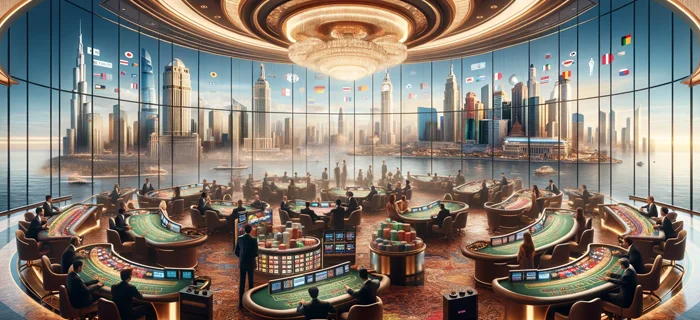A couple of decades ago, gamblers faced significant challenges. The main issue was the necessity to visit a land-based casino to engage in gambling activities, a convenience not readily available to many across the globe.
For instance, countries like Turkey or Norway host fewer than 10 casinos in total, making physical access to these venues quite difficult for the majority of residents.
Table of contents
But everything transformed with the emergence of online gambling websites. Nowadays, almost anyone can access an online casino and begin a gaming session within seconds. Consider the Czech Republic: While this country hosts numerous brick-and-mortar casinos, many players still prefer visiting Euro online casino due to the unmatched convenience they offer. Foreign and offshore online casinos are too appealing to overlook for devoted gamblers.
❓ But how have international casinos developed over the years? And are they legal to begin with? In this post, we will address both questions.
The development of international online casinos
The rise of international online casinos is like a revolution in the gambling world. What was once a slow, stuck-in-the-mud, and exclusive industry suddenly popped up everywhere and became super easy to get into. So, how did that happen?
Well, online gambling came about from the mix of new tech and what people want. The Internet changed the game in the 1990s, and other tech advances helped kick-start new types of gaming websites with cool casino offers and articles.
People saw what was up and started wanting more. And just like that, online casinos became a thing.
Now, these websites have gone beyond borders and turned into a worldwide craze with countless gaming options. This growth happened alongside the spread of the Internet across the globe.
👀 The latest numbers show that nearly 70% of the world’s population can get online as of January 2024.
This means international online casinos have the chance to reach almost everyone on the planet. Even by drawing in just a small bunch of these folks, they're looking at millions of customers.
And best of all, the job gets easier when you grasp the impact of what online casino offers. For example, these platforms enable a smooth transition from elite and exclusive traditional casino games into digital formats accessible across a variety of devices:
- Desktop computers
- Laptops
- Mobile phones
- Smartwatches
In a nutshell, this relatively recent trend has completely democratised gambling by giving almost everyone the opportunity to experience what it’s like to gamble. Consequently, international online casinos have become formidable rivals to their physical counterparts.
Legal landscape of international gambling
Online gambling's reach is vast, yet its legality isn't as universal as the movies might suggest. While movies depict gambling scenes worldwide, the truth is more complex.
Laws vary significantly, making the legal landscape for online gambling a patchwork. In some places, it's embraced; in others, strictly forbidden. Understanding these legal nuances is key for anyone engaging with online casinos, highlighting the importance of navigating this space with caution.
👉 This is because various states have differing – and often conflicting – casino legislations.
Despite the significant variance in gambling regulations from one jurisdiction to another, there are certain commonalities. A key focus of these regulations is balancing the economic advantages of gambling with concerns about social welfare and public health.
Many countries have established licensing systems to oversee the operations of both brick-and-mortar and online casinos.
For instance, in the United Kingdom, the Gambling Commission serves as the official regulatory body for the casino industry. This agency enforces strict requirements on operators to ensure they meet the UK's legal standards.
However, regulating the online domain poses its own set of challenges. It's not as straightforward to regulate as physical gaming venues because digital online casinos utilise cutting-edge technologies that often outpace governmental institutions.
👀 Moreover, the introduction of cryptocurrencies brings additional complexities to the gaming sector.
Although this technology introduces new payment methods and games (like the latest card games for hiking), it also complicates regulation efforts.
Finding a way to adequately regulate the online gaming industry on an international scale remains challenging. Despite these hurdles, cross-border cooperation among regulatory bodies is becoming stronger and more flexible.
Looking ahead
Now that we know so much about international gambling, it is evident that this niche is evolving much faster than traditional land-based businesses. In such circumstances, it wouldn’t be wise to make bold predictions about the future of online casinos.
However, we can probably conclude that new tech solutions will continue to significantly influence the gambling industry.
For instance, almost everyone expects virtual reality to become a much more influential factor in this area. This technology will not only allow users to play games but also to immerse themselves in the overall casino environment.
Just think about it for a moment and you will realise how truly revolutionary VR can be: Instead of merely staring at a phone screen, you could experience a 360-degree environment with all the details so typical for gambling as such.
👉 But there’s more: Our educated guess is that online casino games are going to become even more entertaining. Game developers will achieve this by integrating a subtle level of personalisation – each player will have the privilege of selecting a theme perfectly tailored to his or her own gaming preferences.





